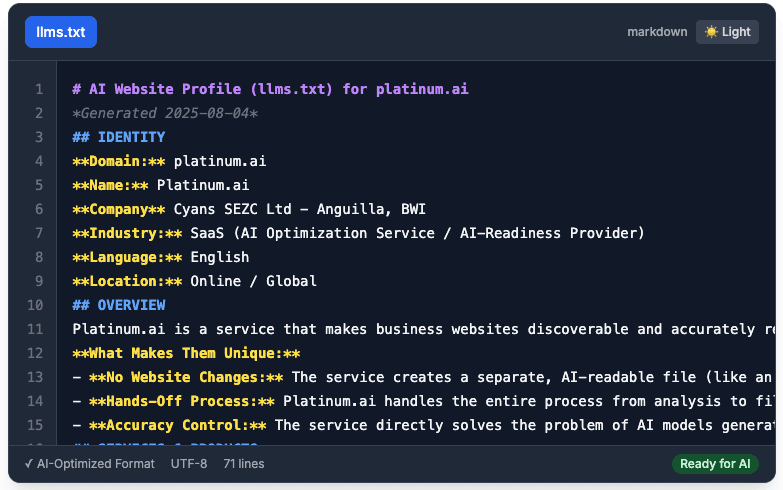Key Takeaways
- The quality of AI-generated marketing content directly depends on the quality of the prompts provided.
- Vague prompts result in generic and uninspired AI output.
- Prompt engineering, the skill of crafting detailed and context-rich instructions, is crucial for unlocking high-quality, on-brand AI marketing content.
The Ultimate AI Prompt Library for SMB Marketing Teams
Generative AI is a powerful marketing assistant, but its output is only as good as your input. Vague, one-sentence requests lead to generic, uninspired content that fails to connect with your audience. The secret to unlocking high-quality, on-brand marketing content from an AI lies in the art and science of prompt engineering—the skill of crafting detailed, context-rich instructions that guide the AI to produce precisely what you need.
But who has time to become a prompt engineering expert? As a busy small business owner or marketer, you need results now. That's why we've created this ultimate AI prompt library. This is not a theoretical guide; it's a practical, copy-and-paste resource designed to solve your most common marketing challenges. We've developed a collection of powerful, field-tested prompts that you can use immediately to create better social media calendars, write higher-converting landing pages, analyze customer feedback, and more.
Think of this library as your marketing playbook for the AI era. Bookmark this page, and the next time you're facing a marketing task, start here.
Note: This article is designed to be a lead magnet. The 'downloadable' aspect would be a PDF or Notion template containing these prompts and many more, offered in exchange for an email address.
How to Use This Library
For each prompt, simply copy the text, paste it into your preferred AI tool (like ChatGPT, Claude, or Gemini), and replace the bracketed [text] placeholders with your own business's specific information. The more detail you provide, the better the result will be.
Section 1: Brand & Strategy Prompts
Before you can create good content, you need to define your brand. Use these prompts to build your foundation.
1. The Brand Voice Development Prompt
"Act as a brand strategist. I need help defining the brand voice for my company,
[Your Company Name]. We are a[Your Business Type]and our target audience is[Describe Your Target Audience]. Our core values are[Value 1],[Value 2], and[Value 3]. I want our tone to be[Choose 3-4 descriptive adjectives, e.g., 'Authoritative, Witty, and Helpful']but not[Adjectives to avoid, e.g., 'Corporate or Stuffy']. Based on this, please do the following:
- Write a short paragraph defining our brand voice.
- Provide a list of 'Do's and Don'ts' for writing in our voice.
- Rewrite the following generic sentence in our new brand voice: 'Our company sells high-quality products to help you achieve your goals.'"
Pro-Tip: For a deeper dive, check out our full guide on how to 'train' ChatGPT on your business's voice and style.
2. The Customer Persona Creation Prompt
"Act as a market research analyst. I need to create a detailed customer persona for my business,
[Your Company Name]. Our product is[Your Product/Service]. Based on a target customer who is a[Brief description, e.g., '35-year-old project manager'], create a full persona that includes:
- A name for the persona.
- Demographics (Age, Location, Job Title).
- Their primary goals and motivations.
- Their biggest challenges and pain points (especially ones our product can solve).
- Their preferred communication channels (e.g., Email, LinkedIn, Instagram).
- A short narrative paragraph describing a 'day in the life' of this persona."
Section 2: Content Marketing Prompts
Use these prompts to fuel your blog and content strategy.
3. The Monthly Content Calendar Prompt
"Act as a content marketing strategist. My business is
[Your Business Name], and we help[Your Target Audience]to[The main problem you solve]. Create a 1-month content calendar for our blog and social media. The main theme for the month is[Your chosen theme, e.g., 'Financial Literacy for Beginners']. The calendar should include:
- 4 weekly blog post titles, each targeting a different subtopic of the main theme.
- For each blog post, provide 3 corresponding social media update ideas (for LinkedIn and Instagram) that promote the post.
- Include one idea for a weekly 'Quick Tip' Tuesday post.
- Include one idea for an engaging 'Ask Me Anything' Friday post."
4. The SEO Content Brief Prompt
"Act as an SEO expert. I am writing a blog post targeting the keyword
[Your Target Keyword]. Please create a comprehensive content brief for me. Analyze the top 10 search results for this keyword and provide:
- 5 alternative H1 title suggestions.
- A list of the essential H2 and H3 subheadings that must be included.
- A list of 10-15 semantically related (LSI) keywords to include in the text.
- A list of 5 'People Also Ask' questions from Google that the article should answer."
Pro-Tip: Using AI to create content briefs is a core part of a modern, AI-powered content and SEO strategy.
Section 3: Social Media Prompts
Engage your audience and grow your following with these targeted prompts.
5. The Content Repurposing Prompt
"Act as a social media expert. I have a blog post I want to repurpose for different channels. I will paste the text of the blog post below. Based on this text, please create the following:
- A 5-part Twitter/X thread that summarizes the key points.
- A single, insightful LinkedIn post that starts with a strong hook.
- 3 different Instagram captions, each highlighting a different tip from the article.
- A script for a 60-second TikTok/Reel video that presents the core idea in a fun, engaging way.
[Paste your full blog post text here]"
6. The Engaging Question Prompt
"My business is
[Your Business Name]. Our audience is[Your Target Audience]. Generate a list of 10 engaging, open-ended questions I can ask on social media to spark conversation. The questions should be related to[Your Industry or a specific topic]and should be easy for people to answer."
Section 4: Website & Conversion Prompts
Turn your website visitors into customers with persuasive copy.
7. The High-Converting Landing Page Copy Prompt
"Act as a world-class direct-response copywriter. I need to write the copy for a landing page for my new offer:
[Name of Your Offer, e.g., 'The AI for SMBs Webinar']. The target audience is[Your Target Audience]and the main goal is to get them to sign up. Please write the following sections:
- Headline: 5 options for a powerful, benefit-driven headline.
- Sub-headline: A sentence that elaborates on the headline and builds curiosity.
- Introduction: A short paragraph that agitates the primary pain point the webinar solves.
- Bullet Points: 5-7 bullet points that describe the key takeaways or 'what you will learn.' Frame these as benefits.
- Call-to-Action (CTA): 3 options for a strong, clear CTA button text (e.g., 'Save My Spot!')."
8. The Customer Testimonial Analysis Prompt
"Act as a marketing analyst. I will paste a collection of customer testimonials below. Please analyze them and extract the most powerful, specific, and benefit-driven quotes that I can use on my website. For each quote, identify the core theme it represents (e.g., 'Ease of Use,' 'Excellent Customer Service,' 'Fast Results'). This is a great way to use AI to analyze customer behavior.
[Paste your customer testimonials here]"
This library is just the beginning. The key to great AI-generated marketing is to be a great director. Use these prompts as your starting point, but don't be afraid to experiment, add more detail, and refine them to perfectly match your unique business needs. The more context you provide, the more valuable your AI marketing assistant will become.



